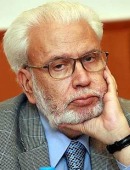Monday September 17, 2007
Thoughts to chew on
THE designer hijab (headscarf or veil) and abaya (the Arab black long robe) are simply gorgeous. Well, yes, they cost a bomb, but these are “proper” Islamic wear. So can a Muslim add them to her wardrobe?
“No,” says Dr Heba Raouf Ezzat, a member of the Council of 100 for Western-Islamic Understanding. She was speaking at the recent conference on “Muslim Women in the Midst of Change”, in Kuala Lumpur.
Even though an outfit may cover the aurat (parts of the body that are supposed to be covered up, according to Islam), the fact that it is exclusive and pricey means it is just not Islamic, Heba explained.
“Muslims are forbidden to wear clothes as a ‘costume of fame’. We have to be humble in what we wear.”

Thus, clothes, including headscarves that reveal one’s economic standing and makes distinctions between people, would be frowned upon by the religion.
“The veil or headscarf puts an egalitarian demand on women. You can pick and choose something that looks elegant and expensive, but the veil sort of puts a ceiling on that because at the end of the day, there isn’t much you can do because you are covered up.”
But the “over-obsession” with the hijab exasperates Dr Heba, who teaches political theory at Cairo University, because the female headgear is only one dimension of the religion.
“I am more concerned about how we deal with our bodies and consumerism. My concern is that the headscarf is being turned into a kind of commodity, and about the woman who veils yet does not abide by the humility that the religion symbolises.”
Dr Heba argued that humility in dressing (as well as in other aspects of life) applies to both women and men.
“I get annoyed when people always talk about the female body and the veil but don’t question what a man can or can’t wear. Men have restrictions, too, in Islam,” she stressed. In her view, men should not be strutting around in expensive, posh suits.
“We should fight consumerism so that our bodies do not become commodities. This is a burden that both men and women should be carrying,” said.
One of her fears is that the headscarf issue could be used by some for political negotiation, “when we should be talking about poverty, violence, authoritarian regimes, ecology, health, how to tame capitalism – the things that really matter.”
Dr Heba pointed out, too, that Islam forbids Muslims from living closeted lives. “Living and enjoying life in a good way is what God wants for us,”
Having dreams, aspirations and a sense of humour are all part of living that life. “People are human beings – not saints,” she added.
Thus she finds it somewhat odd that Muslims have turned mosques into “temples” of worship.
“The mosque is not a holy place. It is a social place. The holy part of it is temporary – limited to the times of prayer and that’s only five times a day.
“The mosque should be open to all around the clock for activities of society, including being the playground of children so that they come to the grounds.” What about those who say that the layman should not ask questions of the religion because the human mind is limited and cannot fully understand. Questions are regarded as a lack of faith and tantamount to questioning God.
As far as Dr Heba is concerned, everyone should ask questions because this is how people arrive at a body of knowledge.
“Even the angels asked God questions like, ‘Why are you creating Adam because man would cause bloodshed?’ And God allowed that. He said, ‘I know better than you.’ He didn’t say, ‘No questions allowed.’”
While Dr Heba’s talk was sprinkled with tongue-in-cheek comments, another speaker, Dr M. Haytham al-Khayat, was more academic in his presentation at the conference. But he also gave the audience a huge chunk to chew on.
Dr Al-Khayat, a member of the Board of Trustees of the International Union of Muslim Scholars, addressed common “errors” in Islamic thought.
First, he noted that the Arabic language asserts “absolute equality” between men and women and that Muslim scholars are in agreement that the Quran speaks of all believers, both men and women.
Hence faith, controlling one’s anger, forgiveness, attending to prayers, charitable spending and determining matters through consultation are equally applicable to men and women.

“Nevertheless, some Muslims today insist that deciding matters through consultation among Muslims should be limited to men only,” he said.
For him, the religion asks that men and women are treated on equal footing with regards to their financial and economic independence and competence.
Pointing out that faith is linked to good work in no less than 82 verses in the Quran, he added that just as the pursuit of knowledge and learning is the duty of every Muslim, so is work.
It was imperative, he added, that men and women received the same wages when they did the same work.
Dr al-Khayat named some women who held top public posts during the early days of Islam.
There was al-Shifa Abdullah who, during Caliph Umar al-Khattab’s time, was appointed head of the al-Hisbah system, the highest authority controlling market activity and transactions, including quality control and prevention of cheating and fraud.
Then there was al-Samra bint Nuhayk, head of the supervisory department in Mecca.
“Such was the state of affairs in the Islamic society 14 centuries ago, at its purest period, before decline started to set in,” he said.
Islam also states that men have a responsibility towards women. Dr al-Khayat added this was because women have been accorded the ability to give birth.
“Men are caretakers. They take care of the women. But this does not mean dominance or superiority over women,” he stressed.